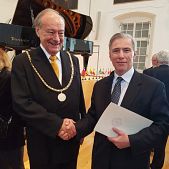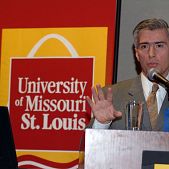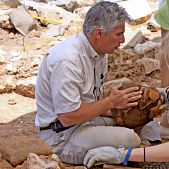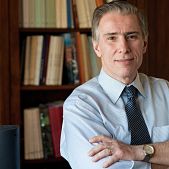
A Greek researcher in the European Academy of Sciences and Arts
European Academy of Sciences and Arts inducts Michael Cosmopoulos at a ceremony held at the University of Salzburg. The induction puts Cosmopoulos, the Hellenic Government-Karakas Foundation Endowed Professor in Greek Studies, among the ranks of top scholars and scientists including 33 Nobel Prize winners and one pope, Benedict XVI.
“I had been told that I had been nominated, but knowing how strict the criteria for election are, I had not seriously thought that it was going to happen,” said Cosmopoulos, a UMSL faculty member based in the Department of Anthropology and Archaeology.
“There is certainly a sense of satisfaction that scientists and scholars derive from the recognition of their work,” Cosmopoulos said. “Beyond that, there is also the sheer intellectual pleasure of belonging to a group of leading scientists from different countries and of being able to exchange ideas, knowledge, information and the fruits of our research.”
Europe’s premier research academy and think tank, the academy pursues a mission to promote and facilitate interdisciplinary and transnational research in a wide range of disciplines.
Cosmopoulos has worked tirelessly for the promotion of Greek studies in North America. He said membership in the academy opens new doors and new ways of looking at the sciences, including how the disciplines interact with each other and affect lives.
In addition to being inducted, Professor Michael Cosmopoulos was invited to lecture at Alma Mater Europaea, the European Academy of Sciences and Arts’ own university.
“The bigger picture here is that all of us serve a common purpose, which is to enhance our understanding of life and the world for the benefit of humanity,” he said. “The academy is a great vehicle for this.”
Held in the Great Hall of the University of Salzburg, the induction ceremony included speeches and musical performances.
Cosmopoulos – who teaches Greek history, culture, religion, technology, archaeology, art, language and mythology at UMSL and directs major excavations in Greece – said his experience in Austria was also a reminder of the enduring value of the liberal arts.
“We live in an era when the humanities and the liberal arts are under threat,” said the professor, who is also a fellow of the Academy of Science of St. Louis. “There is a widespread impression among politicians and administrators that universities are supposed to teach only specific job-related skills. In this rapidly changing world of ours it is, however, vital that we teach our students lifelong skills, such as critical thinking, creativity, communication, self-motivation, improvisation and the ability to keep on learning. This kind of education is what our students really need, and it can only be achieved with the inclusion of strong liberal-arts programs.”













